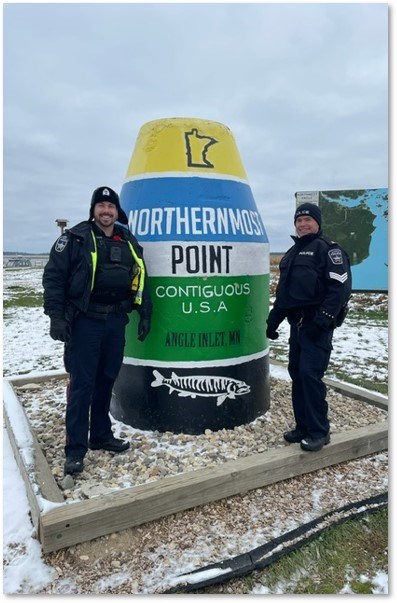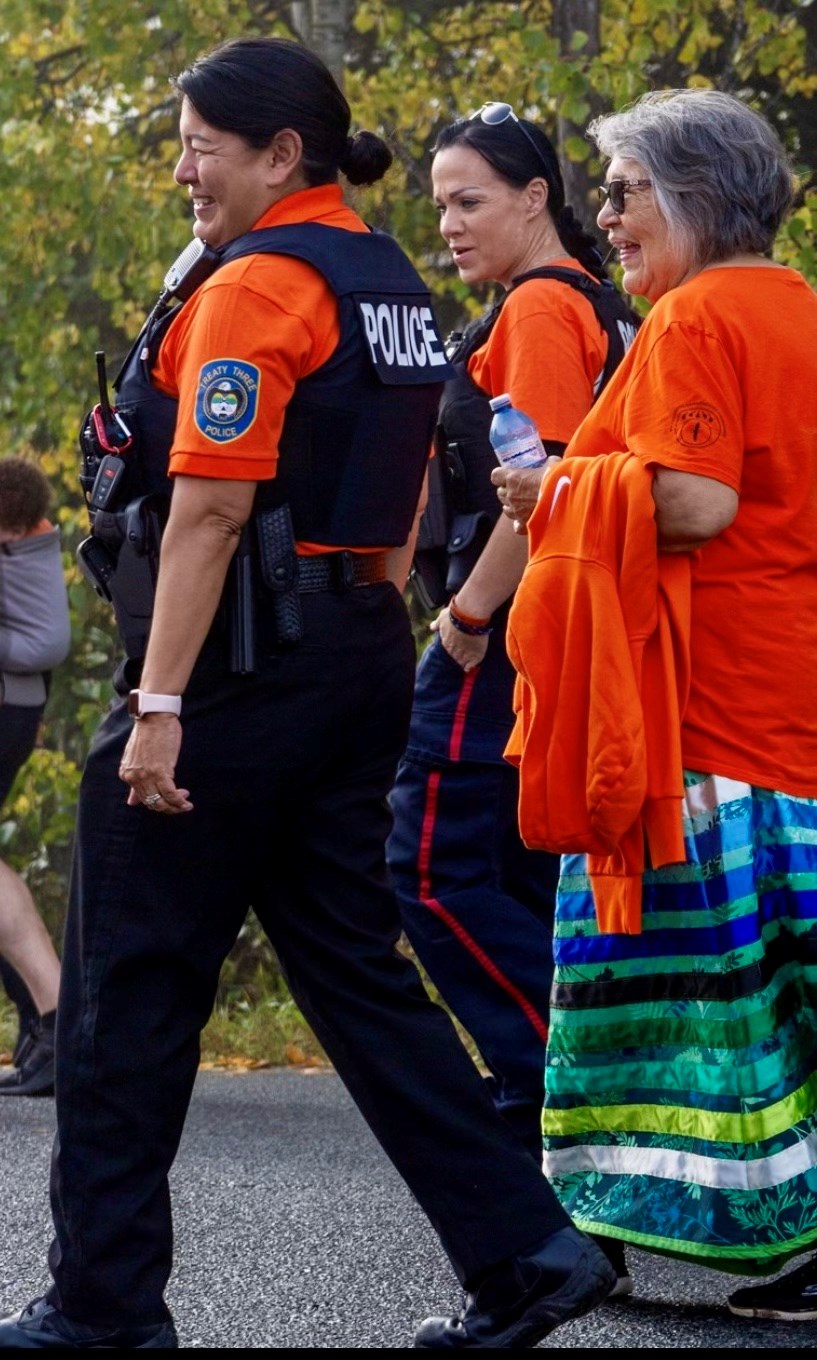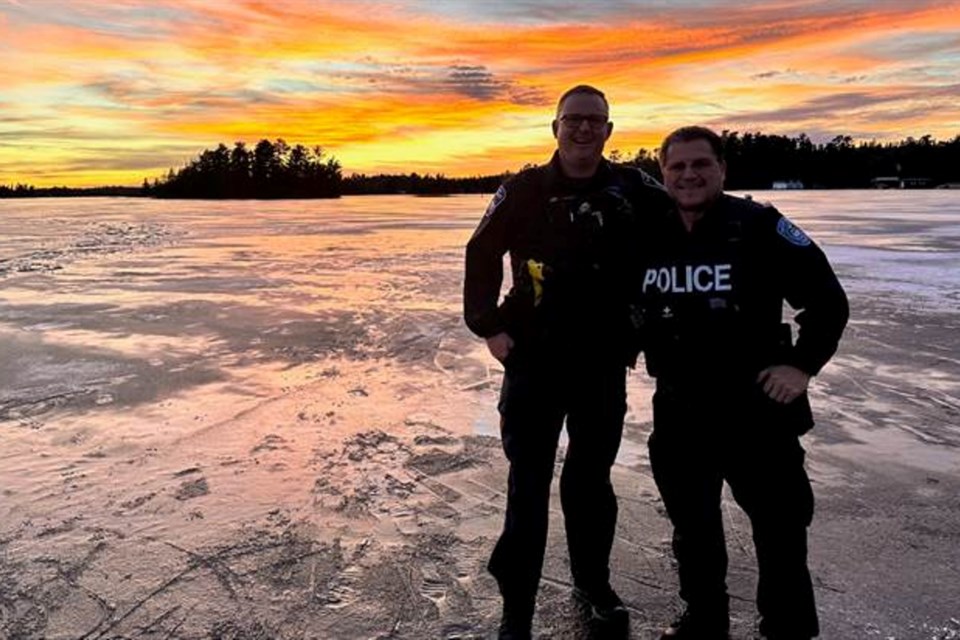Members of the Barrie Police Service got to take part in a unique ride-along program last fall — where they were the passengers.
A presentation to the Barrie Police Services Board on Thursday morning explained the program, which saw 12 officers head north to participate in a two-week “ride-along” with members of the Treaty 3 Police Service.
The Treaty 3 Police Service is a self-administered First Nation police service responsible for an area spanning some 55,000 square kilometres of the Greater Treaty 3 Region in northwestern Ontario.

The program, which took place between Sept. 17 and Dec. 10, 2023, provided a “unique and impactful” experience for participating officers, Barrie police Sgt. Stephanie McKibbon said during Thursday's meeting.
Barrie police has maintained close relationships with the Treaty 3 Police Service for many years, she noted, adding the idea was sparked out of collaborative discussions among the two services. The trip was aimed at providing Barrie police members with “the distinctive opportunity for operational deployment alongside the partnering service,” McKibbon said.
“During the deployment, members would immerse themselves in traditional Indigenous cultures and practices, equipping them with culturally sensitive approaches when interacting with Indigenous community members as well as enhance their effectiveness in dealing with all marginalized community members they engage with,” she said.
The program ended up receiving interest from more members than they had available spots, said McKibbon, adding members selected represented a diverse cross-section of the city's police service, with a significant number being front-line officers.
One of those front-line officers was Const. Rebecca Henderson, who took part in the program at the end of September.
A 20-year veteran with Barrie Police, Henderson said she jumped at the opportunity to take part in the program.
“As soon as I heard about it, I wanted to do it. I wanted to see what it was like to police on reserves and see what it was like for officers working for Treaty 3,” she said.
And seeing first hand the huge land area that the department is responsible for, in addition to the limited resources they have, was a definite shock, Henderson added.
“How far the reserves are from the station was unbelievable. It can be a 90-minute drive from the station to one of the reserves. If you get a call for service, that’s your response time and that’s for a priority one call,” she said.
“A lot of the areas don’t have cell reception and there are officer safety issues when it comes to that kind of thing," Henderson added. "When you are dispatched to a call, it’s ‘you turn down the first street to the right to the blue house with the grey truck.’ There are no addresses.”
Policing in the remote north proved to be “extremely community-based,” she said, and offered her a great opportunity to learn from those officers how to better empathize and engage with people.
“Everyone knows everyone and you have to be a different type of officer with those communities. You have to have that respect from the (community) members. It’s definitely a different way of policing and you are more engaged with everyone,” said Henderson.
Even after 20 years on the job, there is always something new that can be learned, and this partnership posed the perfect opportunity for her to do so, she acknowledged.
“It opened up my mind to more of the culture, to be more respectful to elders and the information you can receive,” she said.
Not only did the experience teach her how to better empathize and engage with the people in her own community, it’s also allowed her to better connect with people.
Since being back, Henderson says she has been an advocate for the program, sharing the benefits with her fellow officers whenever she can.

“It’s an experience that you can’t really put into words of learning how it is to police in such a remote environment. You realize how good you have it as an officer here with all of the resources we have,” she said.
If given the chance, Henderson says she’d go back in a heartbeat.
“I loved engaging with the community. I loved being a part of that. I would recommend to any officer to go and experience it and go see the different type of policing they do, as opposed to what we do," she said. "They are still police officers, but the engagement is so much more than what we have here.”
Barrie officers took part in the program in rotating teams of two, and were partnered to ride-along with a front-line Treaty 3 police officer.
When they arrived, they were welcomed with a smudging ceremony, which ultimately helped set the tone for what McKibbon called the “culturally rich, meaningful and eye opening experience that awaited them."
During their shifts, officers responded to calls within the Treaty 3 patrol areas, an area which encompasses 55,000 square kilometres. Barrie, she noted, spans approximately 100 square kilometres.
“Our officers became integral parts of the policing efforts within the communities they attended, particularly when dealing with individuals facing addiction and or mental health challenges," McKibbon said. "They had the opportunity to witness first hand how Treaty 3 officers approach these situations with a heightened sense of empathy."
Upon returning to Barrie, officers spoke about witnessing the mutual respect demonstrated between the Treaty 3 officers and community members, and how it showcased a deeper and more meaningful connection, she added.
“Not only were the community members respectful and polite with the Treaty 3 officers, the officers were often thanked for their response and their ability to appropriately address their situation," McKibbon said. "It was evident to our officers that the Treaty 3 officers had developed a genuine connection with the members they serve."
McKibbon pointed to a comment she received from a participating officer about how Treaty 3 adheres to a policing model that emphasizes the importance of building relationships with the community it serves, something she said is also a goal that the Barrie Police Service strives to achieve here.
While there is a cost associated with members participating in the program, the primary objective is member development, she added.
“I would argue the most organic way to educate our members about the history and impact of residential schools, treaties and Aboriginal rights, Indigenous law and Aboriginal Crown land relations is by giving them the opportunity to partner with and work alongside the Treaty Police service and gain first-hand experience,” McKibbon said.
It also helps provide them with heightened sensitivity and awareness, and gain empathy in doing their jobs here, she added.
“Our service would love to continue this program moving forward and expand it to include our wonderful civilian members," McKibbon said. "We see significant value in our members immersing them into indigenous cultures and practices as it provides them with firsthand experience — which cannot be taught through traditional training methods.
"This program … is feeling it, learning it and growing as a person and professional.”



